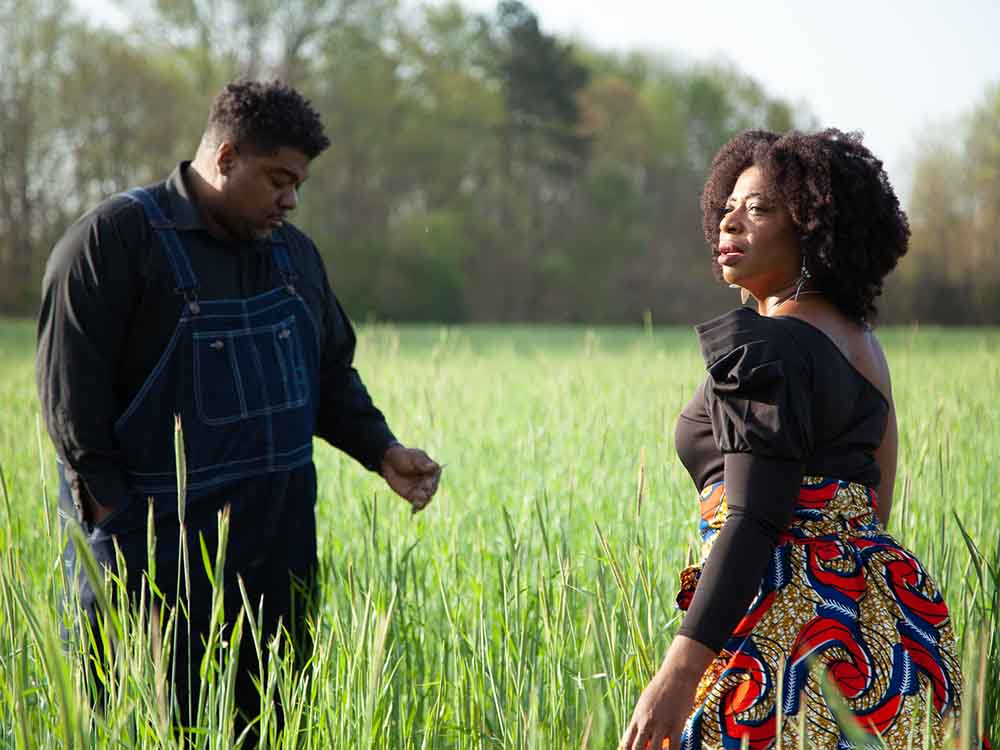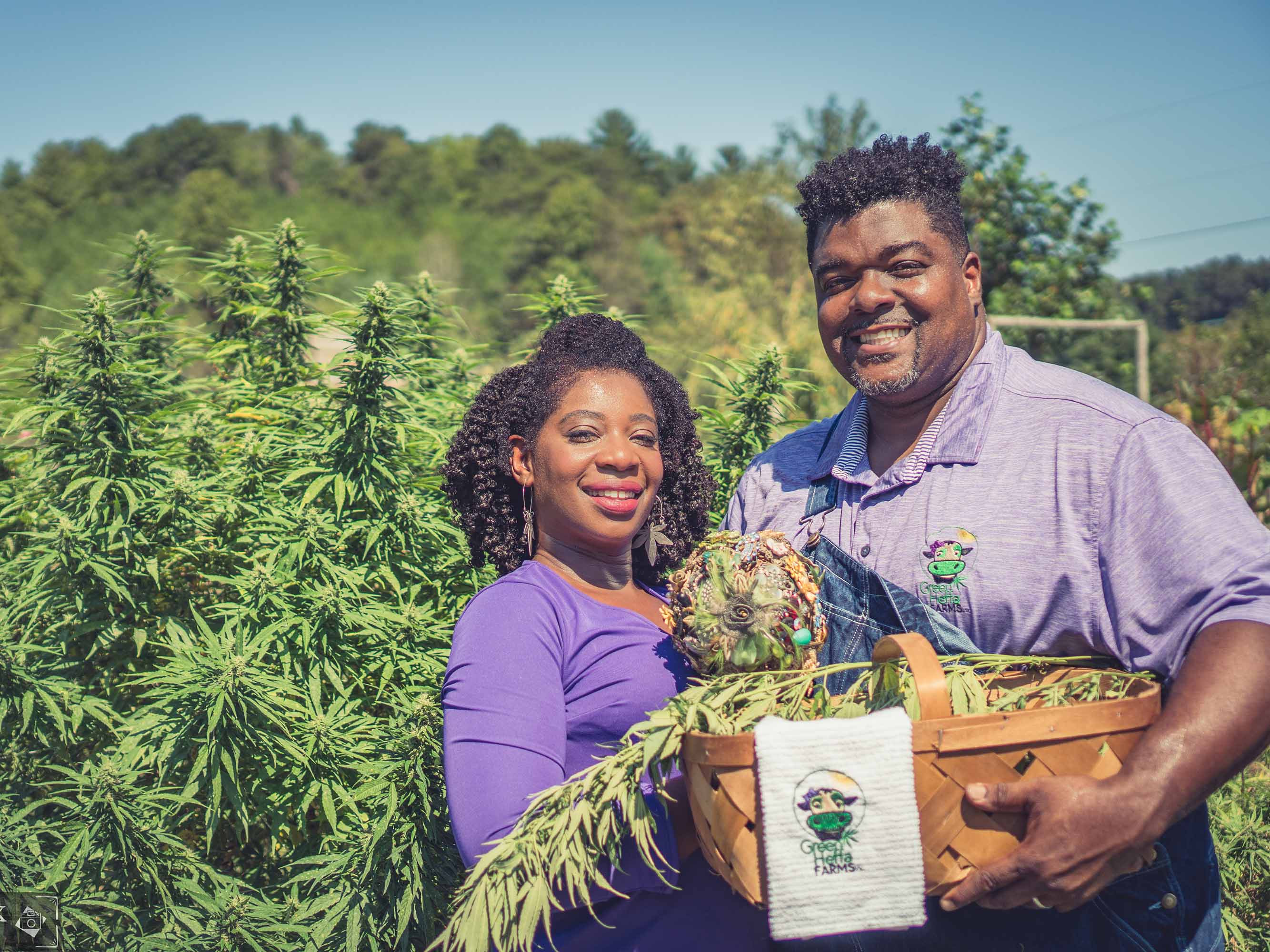Built into the law that legalized hemp is a stipulation that advocates for social and racial justice worry will disproportionately lock poor people and people of color out of the hemp industry.
This article was originally published in Issue 7 of HEMP in August 2019. Subscribe HERE or find in a local grocery store.
Within the next few years, the hemp industry could bring in billions in profits, but who stands to benefit most from those profits, and who will get left behind? One clause buried in the 2018 Farm Bill, often colloquially called “the felony ban,” is already playing a role in determining who exactly will have a place to work in the legal hemp industry.
While the 2018 Farm Bill is famous for federally legalizing hemp by removing the plant and its derivatives from the Controlled Substances Act, it also banned many people with past drug felony convictions from participating in the industry. According to Section 297b of the bill, anyone with a drug-related felony conviction that’s less than 10 years old is barred from being a “producer” in the hemp industry. There’s only one exception: If that producer participated in the industry through a legal hemp program under the 2014 Farm Bill, they are exempted from the ban.
Some states are considering restricting entry to the industry even further. Louisiana, as of the time of this writing, is debating a bill that would extend the ban on people with felonies entering the industry to include anyone with a misdemeanor drug conviction as well. [Editor’s Note: In June, Louisiana passed the bill into law, which bans people with felonies for 10 years and people with drug-related misdemeanors for 2 years from the state’s hemp industry.]
While the nation-wide felony ban received some attention in industry media and pushback from hemp advocates during the debate over the Farm Bill, the potential consequences have received relatively little attention amid celebrations of hemp’s legalization after the bill’s passage.
Grant Smith, deputy director for national affairs at the Drug Policy Alliance, says that the felony ban amounts to a second punishment for convicted criminals.
“These people, they’ve served their sentence and done their time and they don’t deserve to be penalized a second time, and denied the very job opportunity that could provide stability in their lives,” he says.
Proponents of the felony ban see it as a way to make sure the hemp industry doesn’t overlap with the still-federally illegal cannabis industry. But the data is clear: People of color are disproportionately charged with drug-related felonies, and will therefore disproportionately be kept out of the hemp industry. A handful of activists are pushing back, and trying to make sure the hemp industry accounts for the racist history of the war on drugs.
Limits of the Felony Ban Remain Unclear
The felony ban can be traced back to one man: Senate Majority Leader and Republican Senator from Kentucky, Mitch McConnell.
It was McConnell’s plan to get hemp legalization passed as an amendment through the 2018 Farm Bill, and it worked. But when McConnell added his original amendment to the Senate version of the bill to legalize hemp, his language included a ban that was far harsher than the final one. McConnell’s amendment banned anyone with a drug felony from entering the hemp industry, regardless of how old the felony was or if they were already involved in the industry.
“These people, they’ve served their sentence and done their time and they don’t deserve to be penalized a second time, and denied the very job opportunity that could provide stability in their lives.” — Grant Smith
Smith and the Drug Policy Alliance, along with numerous stakeholders in the hemp industry, including the nonprofit Vote Hemp, successfully lobbied to change the original proposal for the felony ban as the bill moved toward passage in late 2018. They were able to lower the ban to 10 years after the date of conviction and include the exception for established state-legal hemp farmers with a felony.
However, Smith still called the revised version a “de facto ban” on anyone with a drug felony in their past. “A lot happens in a person’s life in 10 years,” he says.
He believes the ban serves no purpose other than to perpetuate the stigma around hemp and cannabis, saying: “There’s no merit. There’s no logic to having it. There is no public safety value.”
McConnell could not be reached for comment.

The scope of the ban, in terms of which types of jobs might be affected, is also somewhat unclear to Smith. The 2018 Farm Bill essentially legalized hemp by removing it from under the control of the Drug Enforcement Administration and passing responsibility for writing regulations to the Department of Agriculture. But, as of now, the Department of Agriculture is still writing a national hemp policy and isn’t expected to release its final guidance for months.
The USDA will have some leeway in how it implements the ban. Based on the guidance in the Farm Bill, Smith says he believes it should only apply to whoever applies for the actual grower’s or producer’s license for hemp, and not anyone working under the license holder.
However, until the USDA releases its final policy, it’s not clear if additional people might be affected. Through lobbying and participation in comment public periods, the Drug Policy Alliance and other advocates for equitable drug policy are “working to ensure this is applied as narrowly as possible,” Smith said. However, even the narrowest interpretation, he says, “[It] is still going to harm people.”
Felony Ban Will Hurt Some More Than Others
While hemp has the potential to revitalize rural areas that once depended on other kinds of agriculture, Smith pointed out that the felony ban could potentially leave some residents in these areas unable to participate in a major new economy. That could mean missing out on jobs where they’re needed most.
Race is a major factor in determining who receives a felony for drug crimes. Research consistently shows that while white and black people use cannabis at about the same rates, black people are far more likely to face arrest and more likely to face harsher legal penalties. Despite an increasing number of states legalizing recreational or medicinal cannabis, thousands of people are still arrested every year for simple possession of cannabis — and the majority of those people are black, Latinx or indigenous.
In one example, the nonprofit Vera Institute of Justice looked at all drug-related arrests in New Orleans between 2010 and 2015. While black people represent 60% of the city’s population, they made up 85% of the people arrested for marijuana possession and 94% of those arrested for felony possession charges.
Similar patterns, with regional variations, play out throughout the country and on a national level. According to statistics published by the Drug Policy Alliance, 663,367 people were arrested for violating marijuana laws in 2017 and, of those, about 90% were for possession.
“People of color disproportionately pay the price and communities of color are more likely to be affected [by the War on Drugs],” Smith says.
So, Who Gets Left Behind in the New Hemp Industry?
“It’s unfair, it’s unjust, and it’s un-American,” says Felicia Carbajal, an experienced advocate for equity in the cannabis and hemp industries. “I think [the felony ban] should be offensive to every black and brown person in this country.”
Carbajal first became involved with cannabis equity after watching people with HIV in the Latinx queer community use cannabis for relief. Her experience includes working with CBD pioneer Allan Frankel a decade ago. She’s been raising issues of racial equity in cannabis since before the plant was legalized in California in 2016.
“It’s offensive to not offer opportunities to people who bore the brunt of prohibition,” she says. As part of her advocacy work with coalitions like the Equity First Alliance, an activist group seeking racial justice in the cannabis industry, Carbajal is helping to cultivate new opportunities for people of color.
“It’s offensive to not offer opportunities to people who bore the brunt of prohibition.” — Felicia Carbajal
When we spoke on the phone recently, she was stuck in traffic on the way to Los Angeles Trade Technical College, where students were holding a hemp expo. LA Trade Tech was the first college in the area to promote hemp, but Carbajal worries that students she works with may be shut out by the felony ban.
Carbajal says it’s part of a long tradition where policies aren’t created by the people who suffer the most from them. “The people pushing the conversations [around legal cannabis and hemp] don’t look like people of color, they don’t come from the communities impacted.”
She also points out that the policy is reflective of systematic racism as a whole. Decades of racist policies like redlining, along with the economic consequences of the war on drugs, leave black people and people of color at a disadvantage when it comes to entering a newly legalized industry like hemp.
“Most people of color don’t own property, whether it’s a farm or not, because of the systematic degradation of communities of color,” she says. “Why do communities of color not have the same resources? Because they were never given the opportunity.”
Empowering Black Hemp Farmers at Green Heffa Farms
According to a report published by the Pew Research Center on April 1, black farmers represent only 1.4% of the country’s 3.2 million farmers. While these numbers represent overall farming rather than specifically hemp, they help underline the scope of the problem regarding equity in agriculture.
Carbajal stresses that there are few recorded statistics documenting the level of involvement of black people or people of color in legal hemp industry, but it’s easy to see how and why the industry is overwhelmingly white.
A black hemp farmer named Clarenda Stanley-Anderson, better known online as Farmer Cee, is also working to change the racial imbalance in the hemp industry. Along with her husband, Malcolm Anderson, they operate Green Heffa Farms in Liberty, North Carolina. Stanley-Anderson was recently honored as the Hemp Farmer of the Year at this year’s annual Hemp History Week.

Clarenda Stanley-Anderson (right) operates Green Heffa Farms with her husband Malcolm Anderson (left), in North Carolina, where they’re working to bring more people of color into the hemp industry.
Last year, their farm grew 3 acres of hemp, with plans to expand. They also plan to build a greenhouse where they can grow hemp year-round, and teach more classes to future black hemp farmers. Stanley-Anderson describes Green Heffa as a “social equity” farm, where their goal is to get more people of color involved in the industry and help them realize they have a stake in its development.
She identifies two key reasons why black people have stayed away from hemp farming. One, “farming is too close to slavery,” she says. Two, most farmers work long hours for limited profits, which is a risky sacrifice to make without a strong safety net.
However, she says hemp is changing that. She notes many of the students who come to the classes they teach are “intergenerational.” Young people excited by the prospects of hemp attend along with their parents or grandparents who hope to pass on their lands or farming traditions to their kids and grandkids. “[Hemp] gives farming a totally different look,” she says.
Is Hemp a Commodity or a Dangerous Drug?
Not only is the felony ban discriminatory, Stanley-Anderson pointed out it will exclude talented, knowledgeable people from the industry, at a time when talent is badly needed.
“We know people who are the best growers out there,” she says, “but they can’t get a license because they were busted with weed at 18 or 19.”
Stanley-Anderson says the felony ban perpetuates the stigma around hemp, even as the very people pushing for legalization are working to dismantle the perception that hemp is a dangerous drug, saying, “If it’s a commodity, your policies don’t demonstrate that.”
While the hemp industry wants hemp to be seen as a completely separate plant from marijuana, and treated like any other crop, the felony ban shows it’s still considered dangerous by some.
“Would you stop [people with a drug-related felony] from growing heirloom tomatoes?” asks Stanley-Anderson.
While McConnell recently stated he’s open to supporting more legislation to help protect the new hemp industry, it’s unclear whether that could include revisiting the felony ban. While it’s hard to pin down for sure, multiple industry experts seem to believe the idea for the ban came from the Department of Justice itself.
“There’s probably not much appetite to take this up,” Smith says. But, “it’s something the Drug Policy Alliance will continue to raise and look for opportunities to repeal.”
The Hemp Industry Must Create Unity, Not Sow Division
In the meantime, Stanley-Anderson believes the hemp industry needs to be open to frank, honest discussions about the problems created by systematic racism and the felony ban.
“So far, I’ve been underwhelmed by the response from people outside those already involved in social justice movements or already involved in the cannabis or hemp equity movements,” she says. “We still have a long way to go in 2019 and people don’t want to have that conversation. It’s uncomfortable, it’s an admission of past wrongs.”
She often feels resistance to these topics from hemp industry professionals. “People say if it’s about equity, the only color that should matter is green,” she says. “We want to get to that point, but we have to address a few issues before we get there.”

Clarenda Stanley-Anderson and Malcolm Anderson show off their hemp wares from their North Carolina farm.
She says she believes difficult conversations are necessary. “Sugarcoating isn’t going to solve it, it’s just going to create more inequity,” she says. “As long as we have inequity, there’s going to be tension.”
Both Stanley-Anderson and Carbajal express the need for unity to build a stronger hemp industry and ultimately help the planet itself through the sustainable promise of the plant.
“The community has to come together and support each other’s conversations,” Carbajal says. With the right support, she speculates that hemp could become “a key tenet of the Green New Deal.”
“We still have a long way to go in 2019 and people don’t want to have that conversation. It’s uncomfortable, it’s an admission of past wrongs.” — Clarenda Stanley-Anderson
“People who have resources need to figure out how to share them,” continues Carbajal. “They need to support community-led organizations that are working on bringing us together.”
Stanley-Anderson stresses that equity “[is] not about charity or pity. It’s about making sure that everyone has a shot, especially those who have been criminalized the most.”
Besides, inclusivity strengthens hemp’s future.
“Black farmers have been integral to the agricultural infrastructure of this country,” she says. “Why wouldn’t you want them? It’ll make a better industry.”
Despite her frustration at the tepid response she sometimes receives to raising issues of race in hemp, Stanley-Anderson is ultimately optimistic: “I think this is an industry that can unify us, and be an example to other industries.”

